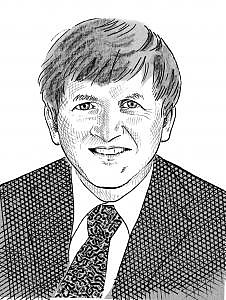The IAS Questionnaire: Charles Simonyi

The Hungarian-born computer software pioneer, philanthropist, and Chairman of Intentional Software Corporation and the Institute’s Board of Trustees has twice visited the International Space Station, amounting to a total of twenty-eight days in space. His father, Károlyi Simonyi, was a physicist and electrical engineer whose book A Cultural History of Physics (AK Peters, 2012) was first published in Hungarian in 1979.
What makes you curious? Immanuel Kant talked about the “moral law within”; I sense that curiosity is also within us like the moral law.
Whom do you most admire and why? J. S. Bach: creator of sublime beauty who worked very hard. Michael Faraday: an intuitive, self-taught genius.
Outside of your own, which field interests you most? I am very interested in physics and the visual and musical arts.
How do you determine your focus? That is hard: focus is an investment, one has to think of the long-term payoff, but also to make the portfolio diversified.
What is the most surprising thing you’ve learned?
I was pretty surprised when I learned that differentiation and integration are opposite (inverse) operations. More recently, Moore’s law on the improvement of computer chips and the law’s extensions to storage and bandwidth continually amazes me.
How do you free your thinking? I fix things, back to the basics, tangible stuff.
What question would you most like answered?
It would be great to know what will be the next step beyond the Standard Model—we may not have to wait very long now.
How has the Institute influenced your perspective? I can sleep well because when Big Questions arise, we have a place to go for the answers.
What is your least favorite characteristic? Ignorance of history. There is no excuse.
Hermann Weyl, who served on the Institute Faculty from 1933 until his death in 1955, once said, “My work always tried to unite the truth with the beautiful, but when I had to choose one or the other, I usually chose the beautiful.” If you had to choose between truth or beauty, which would you choose and why? Maybe this is a false dichotomy since “beauty is truth, truth beauty.” But I understand what Weyl may have thought; beauty is a deep reflection in the human psyche, an incredible heuristic with general utility, while truth is a simpler concept, more utilitarian.
What is the purpose of knowledge? To satisfy our curiosity.
What have you ignored that turned out to be crucial? That time flies.
What is your most treasured possession? My wedding ring.
How do you play? With my wife, we do jigsaw puzzles. It is very much like science: progress spreads from fixpoints and from lucky accidents step-by-step, with lots of pattern matching. She is much better than I.
Which three words best describe the Institute? Long, wide, deep.